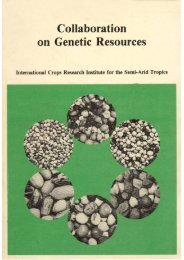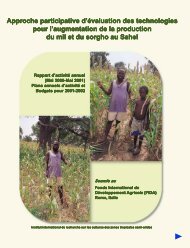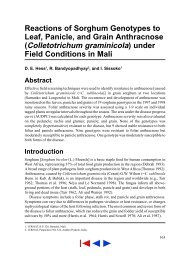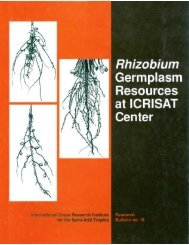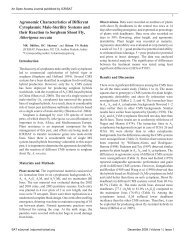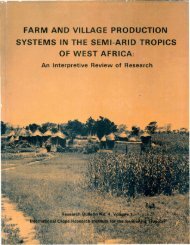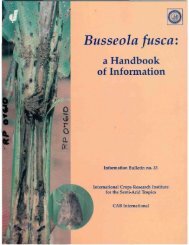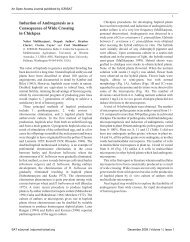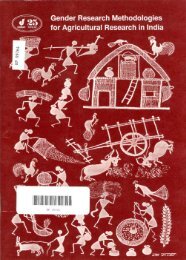information system and participatory approaches for ... - Agropedia
information system and participatory approaches for ... - Agropedia
information system and participatory approaches for ... - Agropedia
- No tags were found...
Create successful ePaper yourself
Turn your PDF publications into a flip-book with our unique Google optimized e-Paper software.
In<strong>for</strong>mation SeekersProgressive members i) Multiplier They are the persons whoaccumulate process <strong>and</strong> store<strong>in<strong>for</strong>mation</strong>.ii) Inquisitor They are the persons who decidethe desirability of <strong>in<strong>for</strong>mation</strong>.iii) Receptive Capabilities of operating ondifferent wavelengths.iv) Gate keeper (Westly& Maclean 1957]Fett 1974)Controlling of <strong>in<strong>for</strong>mation</strong> flow.v) Non-insulated They are constantly ininteraction with happenings inthe surroundings.vi) Space maker They are having copingcapabilities with the recenthappenings in the social <strong>system</strong>.Aphonic PersonsIndifferent persons i) Apathetic attitude They are inactive in seeking<strong>in<strong>for</strong>mation</strong>.ii)meaninglessness(Seeman 1959)The individual is not clear as thewhat he ought to believe. Hecannot predict with confidencethe consequences of acting on agiven belief. The problem ofmeaninglessness, there<strong>for</strong>e, is aproblem of uncertainty. In this hefinds that his existence isirrational, absured <strong>and</strong>meaninglessness.iii) Self estrangement(Fromm 1956,Marcuse 1964, Laing12973)It is the state of mind whereindividual does not experiencehimself/herself as an active agent<strong>for</strong> bearer of human power.iv) Non-receiptive Lack of capabilities of operatingon different wavelengths.v) Powerlessness(P<strong>and</strong>ey 1984, Marx1972, Chambers1983)It is the state of the individualwhere he does not have theaccess to the resources available.vi)Insulated (Chambers1983)They are not in touch with thehappenings in the surroundings.
INFORMATION TYPES• Scientific <strong>in<strong>for</strong>mation</strong>: refers to ideas, thoughts, concepts etc. Which are the product of<strong>system</strong>atic endeavour• Technical <strong>in<strong>for</strong>mation</strong>: refers to the application of scientific <strong>in<strong>for</strong>mation</strong> in day today lifesituation• Policy <strong>in<strong>for</strong>mation</strong>: refers to ideas, thoughts, opinion etc. For making choices of alternatestrategies• Managerial <strong>in<strong>for</strong>mation</strong> / operational <strong>in<strong>for</strong>mation</strong> : refers to ideas enabling production,maintenance <strong>and</strong> servicesINFORMATION USE• Know – why – scientifically oriented• Know – how – technically oriented• Show – how – operationally orientedPARTICIPATORY APPROACHES:PARTICIPATION MEANS DIFFERENT THINGS TO DIFFERENT PEOPLE:PASSIVE PARTICIPATION : people participate by being told what is going to happen or has alreadyhappened. It is an announcement by administration or project management without listening to people’sresponse.PARTICIPATION IN INFORMATION GIVING: people participate by answering questions posed byresearchers by using questionnaire surveys or similar <strong>approaches</strong>. People do not have the opportunity toinfluence proceedings.PARTICIPATION BY CONSULTATION: people participate by being consulted, <strong>and</strong> external agentslisten to views. This does not concede any share in decision making, <strong>and</strong> professionals are under noobligation to take on broad peoples’ views.PARTICIPATION FOR MATERIAL INCENTIVES: people participate by providing resources, <strong>for</strong>example labour, in return <strong>for</strong> food, cash or other material incentives. Though this is called participation,people have no stake in prolonging activities when the incentives end.FUNCTIONAL PARTICIPATION: people participate by <strong>for</strong>ming groups to meet predeterminedobjectives related to the project. These institutions tend to be dependent on external initiators <strong>and</strong>facilitators, but many become self reliant.
INTERACTIVE PARTICIPATION: people participate in joint analysis, which leads to action plans <strong>and</strong>the <strong>for</strong>mation of new local institutions or the strengthening of existing ones. These groups take controlover local decisions, <strong>and</strong> so people have a stake in maintaining structures <strong>and</strong> practices.SELF MOBILISATION: people participate by taking initiatives independent of external institutions tochange <strong>system</strong>s. They develop contact with external institutions <strong>for</strong> resources <strong>and</strong> technical advice theyneed, but retain control over how resources are used. (Extension Digest, 1995 vol 2)TERMS USED IN PARTICIPATORY METHODS• AEA AGRO ECOSYSTEM ANALYSIS• BA BENEFICIARY ASSESSMENT• DELTA DEVELOPMENT EDUCATION LEADERSHIP TEAMS• D&D DIAGNOSIS AND DESIGN• FPR FARMERS PARTICIPATORY RESEARCH• FSE/E FARMING SYSTEMS RESEARCH / EXTENSION• PALM PARTICIPATORY ANALYSIS AND LEARNING METHODS• PAR PARTICIPATORY ACTION RESEARCH• PD PROCESS DOCUMENTATION• PRA PARTICIPATORY RURAL APPRAISAL• PRAP PARTICIPATORY RURAL APPRAISAL AND PLANNING• PRM PARTICIPATORY RESEARCH METHODS• PTD PARTICIPATORY TECHNOLOGY DEVELOPMENT• RA RAPID APPRAISAL• RAAKS RAPID APPRAISAL OF AGRICULTURAL KNOWLEDGESYTEMS• RAP RAPID ASSESSMENT PROCEDURES• RAT RAPID ASSESSMENT TECHNIQUES• RCA RAPID CATCHMENT ANALYSIS• REA RAPID ETHNOGRAPHIC ASSESSMENT• RFSA RAPID FOOD SECURITY ASSESSMENT• RMA RAPID MULTI PERSPECTIVE APPRAISAL• ROA RAPID ORGANISATIONAL ASSESSMENT• RRA RAPID RURAL APPRAISAL• TFD THEATRE FOR DEVELOPMENT• TFT TRAINING FOR TRANSFORMATION(Extension Digest, 1995 vol 3&4)
COMMON PRINCIPLES OF PARTICPATORY APPROACHES• A DEFINED METHODOLOGY AND SYSTEMATIC LEARNING PROCESS - the focus ison cumulative learning <strong>and</strong> their use has to be participative• MULTIPLE PERSPECTIVES – a central objective is to seek diversity, the assumption beingthat different individuals <strong>and</strong> groups evaluate situations in different ways leading to differentactions• GROUP INQUIRY PROCESS – all emphasize the process of group enquiry. This impliesmultidisciplinary, multisectoral mix <strong>and</strong> mixes of outsiders (professionals) <strong>and</strong> insiders (localpeople, farmers etc.)• CONTEXT SPECIFIC – each application is flexible enough to be adopted to suit newconditions <strong>and</strong> actors• FACILITATING EXPERTS – the role of the expert is best thought of as helping the people intheir situation carry out their own study• LEADING TO ACTION – the enquiry process leads to debate about change. Action is agreed,<strong>and</strong> implementable changes represent an accommodation between the different conflictingviews. The debate defines changes which would bring about improvement <strong>and</strong> seeks to motivatepeople to take action to implement the defined changes(Extension Digest, 1995, vol3&4)FIVE PHASES OF PARTICIPATORY PROCESS1. ENTRY PHASE: Establishing rapport <strong>and</strong> <strong>for</strong>ming groups2. PREPARATORY PHASE: Preparing groups <strong>for</strong> making action plans3. PLANNING PHASE: Preparation of action plans in suitable <strong>for</strong>mats4. IMPLEMENTATION PHASE: Execution of action plans5. FOLLOW UP AND EVALUATION PHASEThe process of <strong>participatory</strong> management in each phase is broken down into a series of successiveoperations by conceptualizing <strong>participatory</strong> process into a series of major undertakings – each brokeninto discrete tasks – each task broken down to a series of steps. The basic structure of this process isbased on the principle of learning by doing <strong>and</strong> incremental progression in small steps.Monitoring <strong>and</strong> process documentation are an essential ingredients of the <strong>participatory</strong> process, in termsof the need of participants to assess what has been achieved, identify problems <strong>and</strong> find solutions <strong>for</strong>further improvement.(Extension Digest, 1995)
PROCESS AND METHODS OF PARTICIPATORY EXTENSION MANAGEMENT1. Farmer to farmer extension should be encouraged <strong>and</strong> capacity of farmers <strong>for</strong> experimentation <strong>and</strong>extension should be strengthened. Since each farm is different <strong>and</strong> needs change over time, externalinstitutions must be flexible <strong>and</strong> responsive, <strong>and</strong> ready to learn with farmers.2. The pace of programmes <strong>and</strong> projects must be slow to build motivation, confidence <strong>and</strong> rapport allmost all the groups involved.3. Village based management of programme funds <strong>and</strong> planning are important prerequisites.(Extension Digest, 1995 vol 2)INTER INSTITUTIONAL ARRANGEMENTS FOR PARTICIPATORY EXTENSIONMANAGEMENT1. Widespread training <strong>and</strong> competence building is needed to encourage <strong>and</strong> sustain <strong>participatory</strong>approach. There is need <strong>for</strong> exp<strong>and</strong>ing training in <strong>participatory</strong> methods that focus on joint learning <strong>for</strong>action.2. Joint <strong>approaches</strong> increase contacts <strong>and</strong> linkages between farmers <strong>and</strong> external institutions, increasingthe likelihood of policies <strong>and</strong> practices emerging that satisfy all actors.3. Roles of different institutions involved (eg. In developing joint watershed management need to beclarified)4. Development of strong inter-village institutions can effectively manage activities like credit,marketing, protection of common l<strong>and</strong>s with limited extension support.PROJECT FORMULATIONProject <strong>for</strong>mulation is preparing a blue print of any development programme to be undertaken to effect achange as an answer to a problem in a specified time <strong>for</strong> the benefit of the needy people of a particulararea.Broadly projects are of two kinds1. Area based – rural, coastal, slum etc.2. Target group oriented – tribal, women etc.
The key priorities of any project should be• Need based• Appropriate• Participatory• Benefiting manyThree basic elements of any projects are1. Problem2. Solution3. SupportEvery development project has four characteristics• It has a specific aim• It is an instrument of change• It involves cost, resources, <strong>and</strong> skills• It provides concrete time bound result.Four steps of project <strong>for</strong>mulation• Identifying <strong>and</strong> analyzing the problem• Finding a solution <strong>and</strong> preparing a strategy• Estimating the assistance required• Organizing the monitoring, evaluation <strong>and</strong> follow up.MonitoringGive details of monitoring <strong>system</strong>s eg. What will be monitored, whose responsibility, what records willbe kept, what meetings will be held, who will be in<strong>for</strong>med of progress <strong>and</strong> by whom, how will themonitoring results will be produced <strong>and</strong> who will they be given to? When will all this happen? What arethe existing <strong>system</strong>s <strong>for</strong> financial monitoring? Include details of SKI monitoring <strong>system</strong>.EvaluationWhat are the plans <strong>for</strong> evaluation?Who will be consulted as part of evaluation?What <strong>for</strong>m will the evaluation take, <strong>and</strong> who will do it? (e.g. internal or external)What will be evaluated?How often will evaluation take place? (Stephen 2003)
CONCLUSIONA vast majority of the social <strong>system</strong> nominclated as Aphonic Persons (in this case), have not been ableto participate actively in the process of democratic development. Participatory method is an attempt ofharnessing their potentialities <strong>for</strong> making them active partners in the process of change. This will makethem aware of their rights, arouse initiations, realize their inner strength, absorb useful <strong>in<strong>for</strong>mation</strong> <strong>and</strong>utilize them <strong>for</strong> achievement of meaningful goals. This will be a regenerative process <strong>for</strong> empoweringthem. It can be concluded with saying of Lao Tsu, China “Go to the people, live with them, learn fromthem, love them, start with what they know, build with what they have, but with the best leaders, whenthe work is done, the task is accomplished, the people will say we have done this ourselves.REFERENCESAckoff, C (1961): Quoted by Ambasta, C.K. Unpublished Ph.D. Thesis. "Communication Patterns inFarm Innovation Development, Extension <strong>and</strong> Client Systems in Bihar : A Systems Approach".Division of Agril. Extension, IARI< New Delhi 1974.Agrawal, A <strong>and</strong> Narain, S (1989) : "Towards Green Village - A Strategy <strong>for</strong> Environmentally - Sound<strong>and</strong> Participatory Rural Development". Published by Centre <strong>for</strong> Science <strong>and</strong> Environment, NewDelhi.Arundale, A.C. (1968) : "A System Theory - A Sociological View in Walter Buckley (1968) Sociology<strong>and</strong> Modern Systems Theory". Eglewood Cliffs, New Jersey, Prentice Hall, Inc.(1990) : "The Manila Declaration on People's Participation <strong>and</strong> Sustainable Development". Ifda dossier75/76 January/April.(1989) : "World Commission on Environment <strong>and</strong> Development Our Common Future". Ox<strong>for</strong>dUniversity Press.Beltrans, L.R. (1974) : "Rural Development <strong>and</strong> Social Communication: Relationship <strong>and</strong> Strategies".Paper presented in Cornell CIAT International Symposium on Communication Strategies <strong>for</strong>Rural Development. March 17-22. CIAT Headquarters, Cali, Colombia.Berrien, F.K. (1968) : "General <strong>and</strong> Social Systems" New Brunsurck; Rutgers University Press.Byrnlo F.C. & B.K.J. (1971) : Agricultural Extension <strong>and</strong> Education in Developing Countries inR.Weltzed. Rural Development in Changing world, Cambridge Press.Cassata, Mary <strong>and</strong> Asante Molefi, K. (1979): Mass Communication Principles <strong>and</strong> Practices" MacmillanCo. Inc., New York.Chambers, R (1983) : "Rural Development: Putting the Last First". Longman, London, Lagoes, NewYork.Corea, G (1990) "An International Development Strategy <strong>for</strong> the 90s Global Stakes Require a newConsensus". Ifda dossier, July/Septemebr 78.Dahl, Robert A (1975) : "Modern Political Analysis". 2nd edition. Prentice Hall of India Private Ltd.New Delhi.Extension Digest ( 1995) Participatory watershed management. MANAGE, Hyderabad. Vol 2.Extension Digest ( 1995) H<strong>and</strong>ing over stics to farmers. MANAGE, Hyderabad. Vol 3&4.Felt, J.H. (1974): "Gatekeepers in Agricultural In<strong>for</strong>mation Dissemination". Paper presented in Cornell-CIAT International Symposium on Communication Strategies <strong>for</strong> Rural Development. March17-22. CIAT Headquarters, Cali, Colombia.Fromm, E (1956) "The Same Society" Routledge <strong>and</strong> Kegan Paul Ltd. London.
Hall, A.D. <strong>and</strong> Fagen, R.E. (1968): "Definition of Systems in Walter Buckley (Ed) Modern <strong>system</strong>sResearch <strong>for</strong> Behavioural Scientists. Aldin Publishing Company. Chicago, U.S.A.Jacobs, P <strong>and</strong> Munro, D.A. (1978) : "Conservation with Equity Strategies <strong>for</strong> Sustainable Development".IUCN Publication, U.K.Khoshoo, T.N. (1990) : "Towards a Sustainable Society". The Times of India, Niew Delhi, 2nd March.Laflin, M. (1980) "Environmental Communication: New Roles Hard Choices". DevelopmentCommuncation Report, No. 65, Arlington, U.S.ALaing, R.D. (1973): "The Politics of Experience". Ballomtine Books, Inc. 101 Fifth Avenue, New York.Leagans, Paul, J (1971) : "Extension Education <strong>and</strong> Modernization" in Leagans, Paul, J <strong>and</strong> Loomis,C.P. (Ed) Behavioural Change in Agriculture Concepts <strong>and</strong> Strategies <strong>for</strong> Influencing Transition,Cornell University Press. Ithaca & London.Marcuse, H (1964 : "One Dimensional man". Routledge <strong>and</strong> Kegan Paul Ltd. London.Marx, K (1972) : "Alienated Labour" in Finifter, W.A. (Ed) Alienation <strong>and</strong> the Social System. JohnWiley <strong>and</strong> Sons, Inc. New York.Miles, Mathew B (1964) : "One Temporary Approach". Dell Publishing Company, Inc. New York.P<strong>and</strong>ey, S.R. (1984) : "Alternative Development Communication Ef<strong>for</strong>ts <strong>for</strong> Science Education in RuralIndia". Ifda dossier, 39 January/February.Pietila, H (1990): "Environment <strong>and</strong> Sustainable Development". Inda dossier 77 May/June.Rapport, A (1968) : "Modern Systems Research <strong>for</strong> Behavioural Scientists" Edited work by WalterBuckley. Aldin Publishing Comany, Chicago, U.S.A.Seeman, M. (1959) : "On the Meaning of Alienation". American Sociological Review, 24.Shiva, V (1989) : "Staying Alive Women, Ecology <strong>and</strong> Survival in India". Kali <strong>for</strong> Women, N 84Panschila Park, New Delhi -17.Stephen T. S. (2003) Basic principles of project <strong>for</strong>mulation <strong>for</strong> voluntary organizations. PDC net work,Bhubneshwar – 6.Westley, Bruce, H <strong>and</strong> Maclean, Malcolm, S (1957): "A Conceptual Model <strong>for</strong> CommunicationResearch". Journalism Quarterly, 34 (31-38.Citation: National Workshop on Communication Support <strong>for</strong> Sustaining ExtensionServices. 17-18 February 2004 Eds. Dipak De, Basavaprabhu Jirli <strong>and</strong> K. Ghadei.,Department of Extension Education, Institute of Agricultural Sciences, BanarasHindu University, Varanasi, (India).



